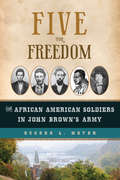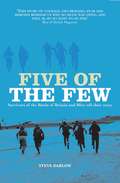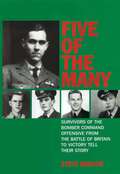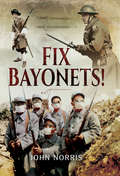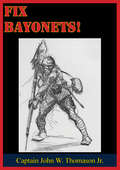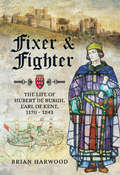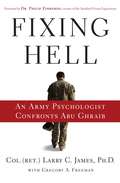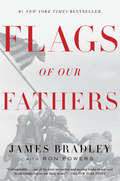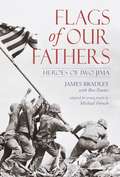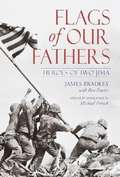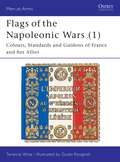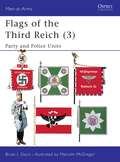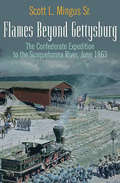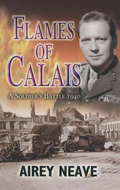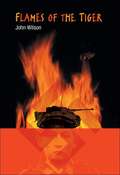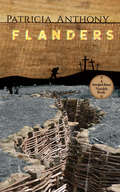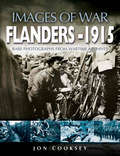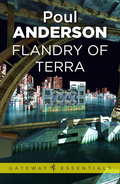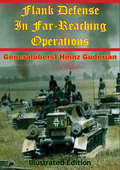- Table View
- List View
Five for Freedom: The African American Soldiers in John Brown's Army
by Eugene L. MeyerOn October 16, 1859, John Brown and his band of eighteen raiders descended on Harpers Ferry. In an ill-fated attempt to incite a slave insurrection, they seized the federal arsenal, took hostages, and retreated to a fire engine house where they barricaded themselves until a contingent of US Marines battered their way in on October 18. The raiders were routed, and several were captured. Soon after, they were tried, convicted, and hanged. Among Brown's fighters were five African American men—John Copeland, Shields Green, Dangerfield Newby, Lewis Leary, and Osborne Perry Anderson—whose lives and deaths have long been overshadowed by their martyred leader and who, even today, are little remembered. Only Anderson survived, later publishing the lone insider account of the event that, most historians agree, was a catalyst to the catastrophic American Civil War that followed.Five for Freedom is the story of these five brave men, the circumstances in which they were born and raised, how they came together at this fateful time and place, and the legacies they left behind. It is an American story that continues to resonate in the present.
Five of the Few: Survivors of the Battle of Britain and Blitz Tell Their Story
by Steve DarlowA personal wartime human history of five RAF airmen who fought Fighter Command&’s air battles during World War II. Five distinguished RAF airmen, four pilots and one radar operator/navigator, who fought air battles during the Battle of Britain and the Blitz, have recounted their experiences in detail to author Steve Darlow. Their stories have never before been published, and they talk engagingly of their service life, combats, losses, injuries, friendships and fears—flying Spitfires, Hurricanes, Blenheims, Beaufighters and Havocs. One pilot tells of the time he fell victim to the enemy, knowing he was going down with his plane. A Beaufighter radar operator remembers being involved in shooting down a German aircraft—&“He took a vertical dive, struck the ground and exploded with a shower of incendiaries. I felt like a child with a new toy. I had at last proved myself but for some reason I suddenly felt a little sad.&” These men would also distinguish themselves in subsequent air campaigns—night defense of the UK, offensive operations over the continent and support to D-Day and beyond. In between the aerial combats and ground attack operations, promotions, decorations and command responsibilities would come their way. But not all would make it through safely to the end of the war. One would end up behind barbed wire. Collectively Five of the Few is a war story of youth maturing, through aspiration and idealism, courage and bravado, fear and heroism, memory and reflection. It is a reminder of why so much was owed, and still is, by so many to so few.
Five of the Many: Survivors of the Bomber Command Offensive from the Battle of Britain to Victory Tell their Story
by Steve DarlowThe daring exploits of five RAF airmen who carried out the truly devastating offensive to defeat the unquestionable evil of Nazi Germany in World War II. In Five of the Many, the enthralling stories of Wellington pilot Rupert Cooling, Wellington and Mosquito pilot Jack Goodman, Halifax pilot Joe Petrie-Andrews, Lancaster pilot Tony Iveson and Halifax and Mosquito navigator Harry Hughes transport the reader into the intensity of the bomber battle over western Europe. Collectively these men help thwart German invasion plans in 1940, and counter the U-boats on the seas and in the factories. They hinder German military industrial production, taking part in some of the most devastating raids in history. They counter the development and deployment of German V-weapons and fly deep into hostile airspace to attack the heart of Germany, Berlin. They clear the way for the Normandy landings and blast the German reinforcement of the battle area. They indulge in special ops, including sinking the Tirpitz, and they directly support the land advances to Germany and disrupt enemy supply lines during the German Ardennes offensive. Their stories are a fitting tribute to the youthfulness of the many, the skill of the many, the determination of the many and the sheer guts of the many. Bomber Command's motto required its airmen to "Strike Hard, Strike Sure." These five special men did just that, fighting hard, flying sure, along the flight path to victory in Europe.
Fix Bayonets!
by John NorrisThe bayonet is an essential item of a soldier's kit even on today's modern hi-tech battlefield. This work examines the origins of this humble weapon and the 'cult of the bayonet' as espoused by the Russian General Alexander Suvorov who asserted that The bullet misses, the bayonet does not. The first bayonets appeared in France in the early 17th century and soon they were being used by every army in Europe. The author examines the spread of this simple weapon and how it led to fundamental changes being made in battlefield tactics. Over 300 years later, in the age of hi-tech warfare and weapons of mass destruction, the bayonet is still in service with armies around the world. British and US forces in Afghanistan regularly have their bayonets fixed. Fix Bayonets illustrates how tactics changed and the design of the weapon, although fundamentally the same, has evolved over the centuries.Much myth and legend surrounds the subject of bayonet charges and the weapon has become an icon of defiance and the determination to do whatever it takes to win. The author examines evidence for the reality of such actions. How did the ordinary soldier feel to be told 'fix bayonets'? John Norris draws on personal accounts of soldiers using bayonets in combat from the Napoleonic and Crimean Wars, various Colonial campaigns, through the World Wars, Falklands War and into the 21st century in Afghanistan. In so doing he explains the seemingly anachronistic survival of this simple weapon on the modern battlefield.
Fix Bayonets! (Classics Of Naval Literature Ser.)
by Captain John W. Thomason Jr.A collection of picturesque and observant stories about the hard-fighting Fifth Marine Regiment in France by a writer who has been called the Kipling of the Marines Corps.During his 27 years as a Marine officer, John W. Thomason also became one of America s foremost illustrators and by virtue of his singular combination of talents, Thomason immortalized the Marines who served in World War I.These stories follow their grim daily lives with ironic humor, acute observation and sympathy from Belleau Wood to the march to the Rhine.— Print Ed.
Fixer & Fighter: The life of Hubert de Burgh, Earl of Kent, 1170 – 1243
by Brian HarwoodHubert de Burgh rose from obscure beginnings to become one of the most powerful men in England. He loyally served first King John and then the young Henry III and played a crucial role in saving the Plantagenet dynasty when it was at its most vulnerable. During King Johns disastrous wars in France, Hubert held Chinon castle against the besieging French for a whole year. He remained loyal when the Barons rebelled against John and, when they invited French invaders to intervene, Hubert successfully held Dover Castle for the king against a siege led by the French Prince Louis. After Johns death, he held it for the new king, 9-year old Henry, against a renewed siege. In August 2017 he struck the final blow against the French invasion, which still held London, when he defeated a powerful fleet carrying French reinforcements at the naval Battle of Sandwich. Hubert continued to serve Henry III, making important reforms as Justiciar of England and leading military campaigns against the Welsh Prince Lewellyn. He eventually lost favour due to the machinations of his rivals and narrowly avoided execution but was eventually reconciled with his king and able to die a peaceful death. Incredibly, this is the first full-length biography of this remarkable man.
Fixing Hell: An Army Psychologist Confronts Abu Ghraib
by Gregory A. Freeman Larry C. JamesThis is the story of Abu Ghraib that you haven't heard, told by the soldier sent by the Army to restore order and ensure that the abuses that took place there never happen again.In April 2004, the world was shocked by the brutal pictures of beatings, dog attacks, sex acts, and the torture of prisoners held at Abu Ghraib in Iraq. As the story broke, and the world began to learn about the extent of the horrors that occurred there, the U.S. Army dispatched Colonel Larry James to Abu Ghraib with an overwhelming assignment: to dissect this catastrophe, fix it, and prevent it from being repeated. A veteran of deployments to Guantanamo Bay, Cuba, and a nationally well-known and respected Army psychologist, Colonel James's expertise made him the one individual capable of taking on this enormous task. Through Colonel James's own experience on the ground, readers will see the tightrope military personnel must walk while fighting in the still new battlefield of the war on terror, the challenge of serving as both a doctor/healer and combatant soldier, and what can-and must-be done to ensure that interrogations are safe, moral, and effective.
Fixing Intelligence: For a More Secure America
by William E. OdomBasing his text in large part on a study he authored in 1997, published by the National Institute of Public Policy, Odom (a senior fellow at the Hudson Institute and a former director of the National Security Agency) considers recommendations for the reform of American intelligence activities and organization. Among his suggestions are granting more intelligence oversight authority over all the diverse intelligence organizations to the Director of Central Intelligence; eliminating CIA obstructionism in expanding military intelligence capabilities; recognizing the need to have national managers for the separate disciplines of signals, imagery, and human intelligence; and taking counterintelligence activities out from under the provenance of the law enforcement agencies. Annotation ©2004 Book News, Inc. , Portland, OR (booknews. com)
Fixing the Facts: National Security and the Politics of Intelligence
by Joshua RovnerWhat is the role of intelligence agencies in strategy and policy? How do policymakers use (or misuse) intelligence estimates? When do intelligence-policy relations work best? How do intelligence-policy failures influence threat assessment, military strategy, and foreign policy? These questions are at the heart of recent national security controversies, including the 9/11 attacks and the war in Iraq. In both cases the relationship between intelligence and policy broke down-with disastrous consequences. In Fixing the Facts, Joshua Rovner explores the complex interaction between intelligence and policy and shines a spotlight on the problem of politicization. Major episodes in the history of American foreign policy have been closely tied to the manipulation of intelligence estimates. Rovner describes how the Johnson administration dealt with the intelligence community during the Vietnam War; how President Nixon and President Ford politicized estimates on the Soviet Union; and how pressure from the George W. Bush administration contributed to flawed intelligence on Iraq. He also compares the U.S. case with the British experience between 1998 and 2003, and demonstrates that high-profile government inquiries in both countries were fundamentally wrong about what happened before the war.
Flags of Our Fathers: A Young People's Edition (Playaway Adult Nonfiction Ser.)
by James Bradley Ron PowersIn this unforgettable chronicle of perhaps the most famous moment in American military history, James Bradley has captured the glory, the triumph, the heartbreak, and the legacy of the six men who raised the flag at Iwo Jima. Here is the true story behind the immortal photograph that has come to symbolize the courage and indomitable will of America. In February 1945, American Marines plunged into the surf at Iwo Jima—and into history. Through a hail of machine-gun and mortar fire that left the beaches strewn with comrades, they battled to the island's highest peak. And after climbing through a landscape of hell itself, they raised a flag. Now the son of one of the flagraisers has written a powerful account of six very different young men who came together in a moment that will live forever. To his family, John Bradley never spoke of the photograph or the war. But after his death at age seventy, his family discovered closed boxes of letters and photos. InFlags of Our Fathers, James Bradley draws on those documents to retrace the lives of his father and the men of Easy Company. Following these men's paths to Iwo Jima, James Bradley has written a classic story of the heroic battle for the Pacific's most crucial island—an island riddled with Japanese tunnels and 22,000 fanatic defenders who would fight to the last man. But perhaps the most interesting part of the story is what happened after the victory. The men in the photo—three were killed during the battle—were proclaimed heroes and flown home, to become reluctant symbols. For two of them, the adulation was shattering. Only James Bradley's father truly survived, displaying no copy of the famous photograph in his home, telling his son only: "The real heroes of Iwo Jima were the guys who didn't come back. " Few books ever have captured the complexity and furor of war and its aftermath as well asFlags of Our Fathers. A penetrating, epic look at a generation at war, this is history told with keen insight, enormous honesty, and the passion of a son paying homage to his father. It is the story of the difference between truth and myth, the meaning of being a hero, and the essence of the human experience of war.
Flags of Our Fathers: Heroes of Iwo Jima
by James Bradley Ron Powers Michael FrenchNow abridged for young people, Flags of Our Fathers is the unforgettable chronicle of perhaps the most famous moment in American military history: the raising of the U. S. flag at Iwo Jima. Here is the true story behind the immortal photograph that has come to symbolize the courage and indomitable will of America. In February 1945, American Marines plunged into the surf at Iwo Jima-and into history. The son of one of the flag raisers has written a powerful account of six very different men who came together in the heroic battle for the Pacific's most crucial island.From the Hardcover edition.
Flags of Our Fathers: Heroes of Iwo Jima (abridged)
by James Bradley Ron Powers Michael FrenchNow abridged for young people, Flags of Our Fathers is the unforgettable chronicle of perhaps the most famous moment in American military history: the raising of the U. S. flag at Iwo Jima. Here is the true story behind the immortal photograph that has come to symbolize the courage and indomitable will of America. In February 1945, American Marines plunged into the surf at Iwo Jima--and into history. The son of one of the flag raisers has written a powerful account of six very different men who came together in the heroic battle for the Pacific's most crucial island.
Flags of the Napoleonic Wars
by Terence Wise Guido RosignoliIn the summer of 1804, the eagle was chosen as the symbol of the French Army by Napoleon himself. The Emperor's sculptor, Chaudet, made the original model, and from this were cast bronze copies in the workshop of Thomire, which would be proudly borne into battle by many a French regiment. This fascinating work by Terence Wise explores in depth the flags, colours and guidons of the Napoleonic Wars (1799-1815), concentrating on France and her allies, and covering every faction from Baden to Würzburg. This book is a must for anyone interested in this fascinating topic.
Flags of the Third Reich
by Malcolm Mcgregor Brian DavisIn his book Mein Kampf Adolf Hitler claims that he made the decision to use the swastika as the emblem for his fledgling movement. He was responsible for the shape the swastika finally took, and for the choice of colours used, which set the pattern for all subsequent flags. In this third of a series of texts [MAA 270 & MAA 274], Brian L. Davis investigates the flags of the Third Reich party and police units, in a text complemented by numerous contemporary photographs, and eight full page colour plates by Malcolm McGregor.
Flags on the Bayou
by James Lee BurkeIn the fall of 1863, the Union Army controls the Mississippi River and much of Louisiana, as the Civil War rolls on.Wade Lufkin is a man without a country or a cause - an idle spectator since New Orleans surrendered, he now paints at his uncle's plantation. That is until he finds an intriguing new subject...Hannah Laveau is an enslaved woman who stands accused of everything from adultery to insurrection, from magic to murder. But all she wants is to find her missing son - and she will risk her life for it.When Hannah goes on the run, she must dodge the calculating and merciless local constable and the slavecatchers that prowl the bayou as she flees through Louisiana, from the cottonmouth snakes and tree-lined swamps to the dingy saloons of New Orleans. From 'the king of Southern noir' (Daily Mirror) comes a powerful and deeply moving Civil War thriller - a story of tragic acts of war, lost and desperate people, and love enduring through it all.PRAISE FOR JAMES LEE BURKE, THE AWARD-WINNING KING OF SOUTHERN NOIR:'James Lee Burke is the heavyweight champ, a great American novelist whose work, taken individually or as a whole, is unsurpassed' Michael Connelly'A gorgeous prose stylist' Stephen King'No argument: James Lee Burke is among the finest of all contemporary American novelists' Daily Mail
Flames Across the Border: 1813-1814
by Pierre BertonThe Canada-U.S. border was in flames as the War of 1812 continued. York's parliament buildings were on fire, Niagara-on-the-Lake burned to the ground and Buffalo lay in ashes. Even the American capital of Washington, far to the south, was put to the torch. The War of 1812 had become one of the nineteenth century's bloodiest struggles. Flames Across the Border is a compelling evocation of war at its most primeval level -- the muddy fields, the frozen forests and the ominous waters where men fought and died. Pierre Berton skilfully captures the courage, determination and terror of the universal soldier, giving new dimension and fresh perspective to this early conflict between the two emerging nations of North America.
Flames Beyond Gettysburg: The Confederate Expedition to the Susquehanna River, June 1863
by Scott L. Mingus Sr.An in-depth look at a Confederate general and the first blood spilled at Gettysburg, with maps, photos, and a guide to historic sites. This book examines the key role played by Lt. Gen. Richard Ewell&’s Second Corps during the final days in June. It is the first in-depth study of these crucial summer days that not only shaped the course of the Gettysburg Campaign but altered the course of our nation&’s history. In two powerful columns, Ewell&’s Corps swept toward the strategically important Susquehanna River and the Pennsylvania capital looming beyond. Fear coursed through the local populace while Washington and Harrisburg scrambled to meet the threat. One of Ewell&’s columns included a veteran division under Jubal Early, whose objectives included the capture and ransom of towns and the destruction of railroad bridges and the Hanover Junction rail yard. Early&’s most vital mission was the seizure of the Columbia Bridge, which spanned the Susquehanna River between Wrightsville and Columbia. To capture the longest covered bridge in the world would allow the division to cross into prosperous Lancaster County and move against the capital in Harrisburg. Flames Beyond Gettysburg vividly narrates both sides of Ewell&’s drama-filled expedition, including key Southern decisions, the response of the Pennsylvania militiamen and civilians who opposed the Confederates, and the burning of the Columbia Bridge. It also features detailed driving tours of the various sites discussed in the book. Based upon extensive primary source material and featuring original maps by cartographer Steven Stanley, this fast-paced and gracefully written history is a welcome and important addition to the Gettysburg literature.
Flames of Calais: The Soldier's Battle, 1940
by Airey NeaveThe defence of Calais in May/June 1940 was a superb example of selfless courage and sacrifice. Sent by Churchill to divert the Germans from Dunkirk and so save the British Army, 30 Infantry Brigade had orders not to evacuate or surrender. Airey Neave, later to be Margaret Thatcher's right hand man until his assassination in 1979, was one of those who fought, was wounded and captured there and his account remains the classic.
Flames of Fury (Executioner #309, Org Crime Trilogy, Book II)
by Don Pendleton Mike NewtonHis brother Johnny's urgent summons draws Mack Bolan into a campaign to take down Maxwell Reed, an exiled Caribbean dictator using an army of mercenaries to stage a coup. Reed is financed by a consortium of international crime lords intent on claiming a stake in the corrupt and violent future of Isla de Victoria. DIRECT ASSAULT Bolan has Reed in his sights when his quarry and those who pay his way move the fight from its stateside beginnings to Panama City and the Bahamas. Along the way, many fall to the guns of the Bolan brothers, a rogue lady Fed and Stony Man's Jack Grimaldi. But the foursome is shattered when one of their own is captured, and all that may be left to fight for is the bittersweet taste of revenge.
Flames of Rebellion
by Jay AllanA group of rebels fighting for independence sows the seeds of revolution across the galaxy in this blockbuster military sci-fi adventure from the author of the Crimson Worlds and Far Stars series.The planet Haven slides closer to revolution against its parent nation, Federal America. Everett Wells, the fair-minded planetary governor, has tried to create a peaceful resolution, but his failure has caused the government to send Asha Stanton, a ruthless federal operative, to quell the insurgency.Wells quickly realizes that Stanton has the true power . . . and two battalions of government security troops—specifically trained to put down unrest—under her control. Unlike Wells, Stanton is prepared to resort to extreme methods to break the back of the gathering rebellion, including unleashing Colonel Robert Semmes, the psychopathic commander of her soldiers, on the Havenites.But the people of Haven have their own ideas. They are not the beaten-down masses of Earth, but men and women with the courage and fortitude to tame a new world.Damian Ward is such a resident of Haven, a retired veteran and decorated war hero, who has watched events on his adopted world with growing apprehension. He sympathizes with the revolutionaries, his friends and neighbors, but he is loath to rebel against the flag he fought to defend. That is, until Stanton’s reign of terror intrudes into his life—and threatens those he knows and loves. Then he does what he must, rallying Haven’s other veterans and leading them to the aid of the revolutionaries.Yet the battle-scarred warrior knows that even if Haven’s freedom fighters defeat the federalists, the rebellion is far from over . . . it’s only just begun.
Flames of the Tiger
by John WilsonIn this novel by John Wilson, Dieter is seduced by the pomp and circumstance of war as a boy growing up during Hitler's rise to power. But as global hostilities intensify, Dieter is called upon to fight for his country in a conflict that he doesn't fully understand. With most of his family dead, Berlin in ruins and the Russian army closing in, Dieter can no longer naively cling to his childhood beliefs. The world he is facing is brutal, dirty and unforgiving, and the most he can hope for is the chance to survive.
Flanders
by Patricia Anthony"A harrowing and beautiful novel, demonstrating — again — that Patricia Anthony is one of our great writers." — Publishers WeeklyIn this gritty look at World War I's trench warfare, a young American sharpshooter ventures into no man's land each night to be ready by daybreak for the grim business of slaying record numbers of enemies. But Travis Lee Stanhope, a Texan serving with an English unit, is haunted by ghosts of the men he's killed as well as those of his fallen comrades. As he hovers on the brink of a transcendent experience, Travis gradually realizes that although he is surrounded by death, his true mission is related to life.A New York Times and American Library Association Notable Book, this tale was acclaimed by Booklist as "a haunting, sometimes almost hallucinatory, yet surprising war novel" and by Kirkus Reviews as "mesmerizing … highly textured and brimming with insight.""Flanders ranks close to All Quiet on the Western Front in its impact." — San Francisco Chronicle"Anthony's subtle and innovative storytelling reaches a new plane in her latest novel, a foray into magical realism that contrasts the waking hell of war with the fragile peace of eternity." — Library Journal
Flanders 1915: Rare Photographs From Wartime Archives (Images of War)
by Jon CookseyBy Christmas 1914 Britain's Regular Army had virtually ceased to exist. Four months of hard fighting had drained its manpower and the Territorial Army were called on to plug the gaps. The part-timers leapt at the chance to serve their country overseas and were soon on their way to the trenches and the harsh realities of war on the Western Front.Flanders 1915 tells the story, through rare and previously unpublished photographs and extended captions, of one of those eager Territorial battalions posted to Flanders during the first twelve months of WW1. It forms a unique and intimate record of the early years of war; many images captured on film by the private cameras of the battalion's junior officers, before official censorship was established. Above all it is a rare and outstanding portrait of the 'great adventure' of war in the days before Loos, the Somme and Passchendaele and the resulting lengthy casualty lists.
Flandry of Terra: A Flandry Book (Gateway Essentials #8)
by Poul AndersonCaptain Sir Dominic Flandry was a top man in the Intelligence Corps of the Imperial Terrestrial Navy. He knew that on the outer edges of the empire, civilisation was spread hideously thin. The stars faded towards barbarism, with the great evil Empire of Merseia beyond.But there were times when Flandry abandoned his senior position of command to go out into the field. Then he operated like the cool and brilliant agent he was, a ruthless, highly-trained professional. And in these three fast-moving adventures Captain Dominic Flandry shows that a space-age secret agent has to stay on top of the job - or succumb to nameless horrors.
Flank Defense In Far-Reaching Operations [Illustrated Edition]
by Generaloberst Heinz GuderianIncludes the World War Two On The Eastern Front (1941-1945) Illustration Pack - 198 photos/illustrations and 46 maps.Often written during imprisonment in Allied War camps by former German officers, with their memories of the World War fresh in their minds, The Foreign Military Studies series offers rare glimpses into the Third Reich. In this study the father of the Panzerarmeen, Generaloberst Heinz Guderian discusses how he and his tanks attained such success in Russia.Focussing on the Second Panzer Army's, which he commanded during 1941, General Guderian discusses the actions for the offensive over the Bug, the crossing of the Dnepr, the attack at Smolensk, the thrust at Kiev, the breakthrough at Orel-Bryansk and the operations around Tula.
